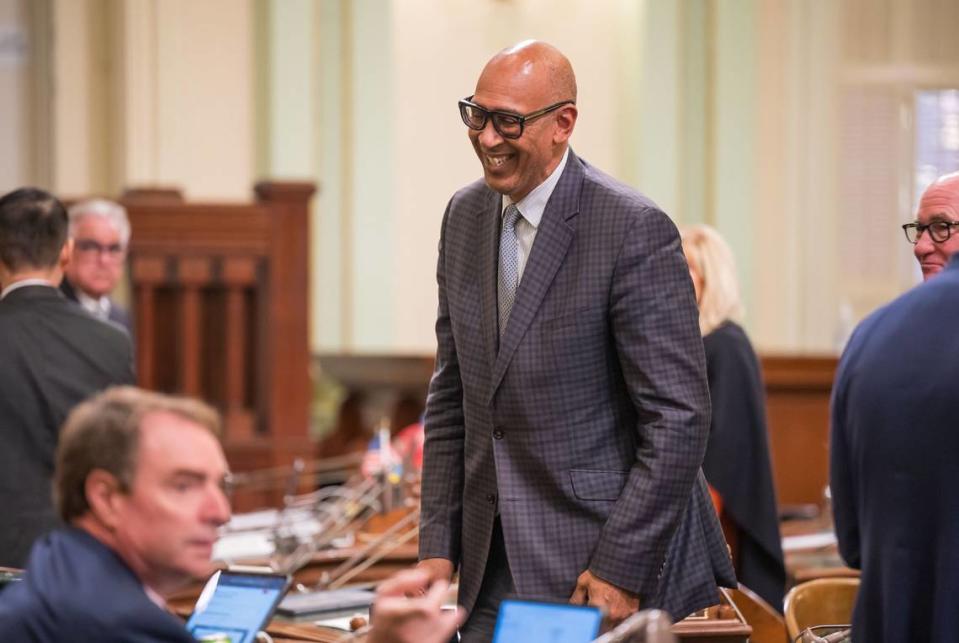California lawmakers pass bill to create fast food council and raise minimum wage to $20
- Oops!Something went wrong.Please try again later.
California’s estimated 500,000 fast food workers are likely days away from celebrating two wins — a nearly $5 minimum wage raise and the creation of a first-in-the-nation council charged with setting pay and workplace standards for the entire industry.
Assembly Bill 1228, authored by Assemblyman Chris Holden, D-Pasadena, sailed through its final votes in the Legislature on Thursday and now heads to Gov. Gavin Newsom. His signature is expected, following an agreement finalized last Monday between labor unions and fast food companies.
Up until then, the two groups were barreling toward a costly 2024 ballot fight that could have reached into hundreds of millions of dollars. The fast food industry has since agreed to withdraw the referendum and labor dropped its plan to hold fast food franchisors legally liable for labor violations committed by their franchisees.
The legislation passed in the Assembly 48-17 late Thursday after 32-8 approval in the Senate earlier in the evening.
“We now have something that workers can be proud of,” said Holden, shortly after the Assembly vote. “They longed for a seat the table. They now have a seat at the table.”
Once signed, the legislation will result in a $20 minimum wage for all fast-food workers at chains with more than 60 locations nationwide. The pay hike is effective April 1.
Future increases would come through the new nine-member fast food council, which is charged with advancing pay and workplace standards. The council will have the power to increase that minimum wage annually by up to 3.5% or the change in the U.S. Consumer Price Index, whichever is lower, and recommend new standards.
The council, a first in America’s fast-food industry, will consist of two representatives of the industry, two franchisees or restaurant owners, two employees, two advocates for employees and one neutral member of the public, who will serve as chair. It is set to hold its first meeting no later than March 1.

“The $20/hr wage and council workers are about to win has the power to lift up more than half a million cooks and cashiers in the state, the majority of whom are women of color,” said Joseph Bryant, executive vice president of the Service Employees International Union. “California fast-food workers are inspiring workers everywhere by challenging corporate power and rewriting the rules of systems designed to work against them.”
A Jan. 1, 2029 sunset date is included in AB 1228, meaning that the law expires then unless extended.
How did the agreement come to be?
The showdown between labor unions and fast food companies began last year with AB 257, also known as the Fast Food Accountability and Standards Recovery Act. The law proposed a 10-member council to set pay and industry standards for employees of chains with more than 100 restaurants.
One day after Newsom signed the law, opponents launched a campaign to qualify a referendum to reverse it. What followed was a signature gathering campaign in which petitioners were accused of inaccurately representing what the law does. The referendum qualified in January, setting up voters to have the last word on the 2024 ballot.
But labor unions also responded this year with AB 1228. The measure aimed to hold companies and their franchisees jointly liable for accusations of harassment, wage theft or other forms of mistreatment. Democrats also revived the Industrial Welfare Commission, a dormant state agency with the authority to set pay and workplace standards for multiple industries, through this year’s state budget.
That strategy led the sides to start working on a compromise, with the help of the governor’s office. They announced an agreement last Monday.
“This agreement creates the best possible outcome for workers, local restaurant owners and brands, while protecting the franchise business model in California,” said Matt Haller, President and CEO of the International Franchise Association.

